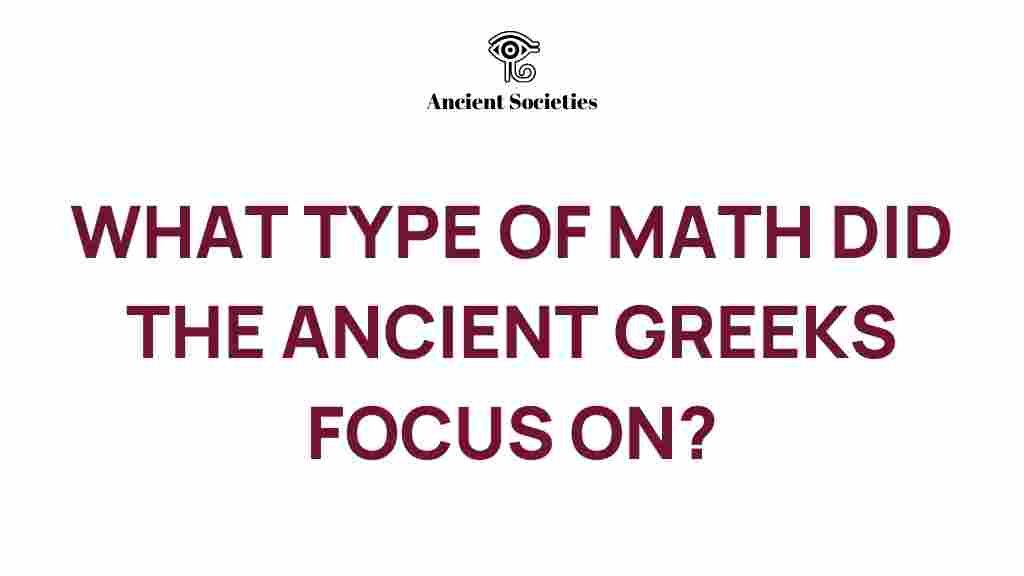Unraveling the Mathematical Mystique of Ancient Greece
The impact of Ancient Greece on the development of mathematics is profound and far-reaching. Renowned for its contributions to various fields, Greece was not only a cradle of philosophy but also a hub for advancing mathematical concepts, particularly in geometry and number theory. This article explores the remarkable achievements of Greek mathematicians like Pythagoras and Euclid, their philosophical underpinnings, and the cultural significance of their work in the history of mathematics.
The Foundations of Mathematics in Ancient Greece
Before diving into specific mathematicians, it’s essential to understand the historical context of mathematics in Ancient Greece. From around 600 BCE, Greek thinkers began to systematically study mathematical principles. This period marked a significant transition from practical arithmetic to abstract mathematical reasoning.
- Philosophical Underpinnings: Mathematics in Ancient Greece was deeply intertwined with philosophy. Thinkers like Plato viewed mathematics as a way to understand the universe, believing that mathematical forms were tied to the essence of reality.
- Development of Geometry: Geometry was particularly significant in Ancient Greece, with mathematicians utilizing it to solve practical problems related to land measurement, architecture, and astronomy.
- Influence on Western Thought: The Greek approach to mathematics laid the groundwork for modern mathematical concepts, influencing countless generations of scholars.
Pythagoras: The Philosopher-Mathematician
Pythagoras (c. 570–495 BCE) is perhaps best known for the Pythagorean theorem, a fundamental principle in geometry. However, his influence extends far beyond this theorem. Pythagoras founded a religious movement known as Pythagoreanism, which emphasized the importance of numbers in understanding the cosmos.
- The Pythagorean Theorem: The theorem states that in a right triangle, the square of the length of the hypotenuse is equal to the sum of the squares of the other two sides. This relationship highlights the deep interconnection between geometry and numerical relationships.
- Number Theory: Pythagoreans studied properties of numbers, categorizing them as odd, even, prime, and composite. Their work laid the foundation for modern number theory.
- Cultural Impact: Pythagorean ideas influenced not just mathematics but also music, philosophy, and science, showcasing the interdependence of various fields.
Euclid: The Father of Geometry
Euclid (c. 300 BCE) is often referred to as the “Father of Geometry” due to his influential work, Elements, which organized and compiled the knowledge of geometry of his time into a coherent framework.
- Elements: This thirteen-book series systematically presents geometric principles and proofs, establishing a foundation for future mathematicians. It introduces definitions, postulates, and common notions that are still taught in geometry classes today.
- Logical Deduction: Euclid’s method of logical deduction is a hallmark of mathematical reasoning. He begins with basic axioms and builds complex theorems, a process that remains central to mathematics.
- Influence on Education: The structure and approach in Euclid’s Elements shaped mathematics education for centuries, influencing the way mathematics is taught in schools worldwide.
The Intersection of Mathematics and Philosophy
The Greeks did not view mathematics merely as a set of tools but as a means to explore philosophical questions. The work of Pythagoras and Euclid raised important philosophical inquiries regarding the nature of reality, knowledge, and existence.
- Plato’s Influence: Plato considered mathematics as a vital component of education, believing that it prepares the mind for philosophical thought. His academy emphasized geometric knowledge as essential for understanding the world.
- Mathematics and the Cosmos: Many Greek philosophers argued that the universe was governed by mathematical laws, leading to the belief that understanding mathematics could lead to understanding the cosmos.
- Legacy of Greek Philosophy: The philosophical ideas surrounding mathematics in Ancient Greece remain influential, permeating various fields such as physics, art, and ethics.
Understanding the Cultural Significance of Mathematics in Ancient Greece
The achievements of Ancient Greek mathematicians cannot be separated from the cultural context in which they emerged. The interplay between mathematics, culture, and society shaped the trajectory of mathematical development.
- Public Works and Architecture: Mathematics was crucial in the design and construction of monumental structures such as the Parthenon, showcasing the practical application of geometric principles.
- Scientific Advancements: The Greeks were pioneers in applying mathematical principles to astronomy and physics, setting the stage for later scientific advancements during the Renaissance.
- Mathematics as a Cultural Ideal: The Greeks revered mathematics as an ideal form of knowledge, associating it with truth, beauty, and harmony.
Challenges in the Study of Ancient Greek Mathematics
Despite the significant contributions of Ancient Greece to mathematics, studying this era presents several challenges.
- Limited Sources: Much of what we know about Greek mathematics comes from later writers and historians, leading to potential gaps and inaccuracies in the historical record.
- Translation Issues: Early texts were written in ancient Greek, and translating these works into modern languages can lead to misinterpretations or loss of nuance.
- Contextual Understanding: Understanding the cultural and historical context of Ancient Greece is crucial for interpreting mathematical texts accurately.
Conclusion: The Enduring Legacy of Ancient Greek Mathematics
The mathematical innovations of Ancient Greece continue to resonate throughout history, shaping modern mathematics, philosophy, and science. Figures like Pythagoras and Euclid not only advanced geometric concepts and number theory but also integrated these ideas into a broader philosophical framework that sought to understand the universe.
By studying the mathematical practices of Ancient Greece, we gain insight into the cultural significance of mathematics and its role in the development of Western thought. The legacy of Greek mathematicians reminds us that mathematics is not just a collection of numbers and formulas but a profound language that helps us articulate and explore the complexities of the world around us.
For more resources on the history of mathematics, you can visit this link. Additionally, if you wish to dive deeper into the philosophical aspects of mathematics, check out this resource.
This article is in the category History and created by AncientSocieties Team

1 thought on “Unraveling the Mathematical Mystique of Ancient Greece”